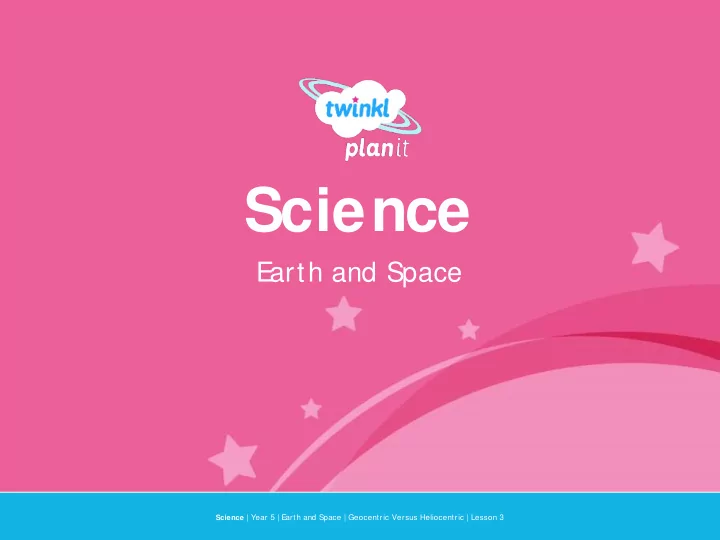

Science E arth and Space Year One Science | Year 5 | E arth and Space | Geocentric Versus Heliocentric | Lesson 3
Aim • I can explain how planets move in our solar system. • I can identify scientific evidence which does or does not provide evidence for an idea or argument. Success Criteria • I can explain how the planets orbit the Sun. • I can distinguish between heliocentric and geocentric ideas of planetary movement. • I can explain theories of planetary movement in the solar system using evidence. • I can identify scientific evidence with support. • I can identify scientific evidence. • I can identify scientific evidence that has been used to support or refute ideas.
Orbit or Rotate What is the difference rotate between orbiting and rotating ? Discuss with your partner and think of orbit how to demonstrate to the whole class. Video courtesy of Stephan Deutsch (@vimeo.com) – granted under creative commons licence - attribution
How Do Planets Move? Discuss the following questions with your talk partner: How do the planets in the solar system move? Where is your evidence? How do you know? Photo courtesy of abstractdawn(@flickr.com) - granted under creative commons licence - attribution
Geocentric Versus Heliocentric WARNING: These videos don’t include Uranus and Neptune because they were discovered after these ideas had been established: How did these ideas change? Slowly over time ideas changed to From ancient times many people what we now believe, which is the believed that the solar system was Heliocentric Model. This means that Geocentric. This means they believed Well, let’s act out the story… the Sun is the centre of the solar that the Earth was the centre of the system and it is orbited by the other solar system and all the other planets planets. and Sun orbited it. Videos courtesy of Waylena McCully(@vimeo.com) - granted under creative commons licence - attribution
Solar System Story Map – Ancients 1 Early Humans – circa 12000 BC Ancient Egyptians – circa 5000 BC
Solar System Story Map – Ancients 2 Ancient Indians – 1400 BC Ancient Babylonian/Sumerians – 700 BC
Solar System Story Map – Ancient Greeks Aristotle - 384 - 322 BC Ptolemy - AD 85 - 165
Solar System Story Map – Islamic Scholars Alhazen - AD 1025 – 1028 Al Katabi – circa AD 1230 - 1240 Tusi – AD 1247
Solar System Story Map – Changing Europe Copernicus – circa AD 1530 Tycho Brahe – circa AD 1587 Galileo – AD 1615
Solar System Story Map – Heliocentric Model Kepler – AD 1617-1621 Newton – AD 1687 Present Day
Planetary Model Story You will all be working in small groups to create a small video clip about one of the astronomers you have been learning about. Top Tips: Include only facts that you have learnt. • • Ensure that you are clear who the clip is about and what they found out. Support what you are saying with • evidence. Add other characters that you have learnt • about – e.g. Tusi could make an appearance in the video about Copernicus.
Changing Scientific Ideas How do scientific ideas change? Why did it take a long time to change from a geocentric to a heliocentric model of planetary movement? What were the important factors leading to change?
Aim • I can explain how planets move in our solar system. • I can identify scientific evidence which does or does not provide evidence for an idea or argument. Success Criteria • I can explain how the planets orbit the Sun. • I can distinguish between heliocentric and geocentric ideas of planetary movement. • I can explain theories of planetary movement in the solar system using evidence. • I can identify scientific evidence with support. • I can identify scientific evidence. • I can identify scientific evidence that has been used to support or refute ideas.
Recommend
More recommend